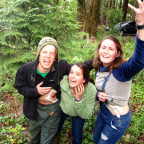main contentCollege Outdoors

College Outdoors provides the Lewis & Clark College community with access to the spectacular outdoor environments of the Pacific Northwest through a variety of activities including hiking, mushroom-hunting, cross-country skiing, backpacking, whitewater rafting, kayaking, and nature meditation. No experience is necessary! Trips are open to Lewis & Clark students, staff, and faculty.
News
Additional Scholarships Available for College Outdoors Trips!
College Outdoors Events
The Indigenous Land Our Community Occupies
The Lewis & Clark College Outdoors program recognizes that we work, play, explore, and learn on the traditional lands of peoples including the Kalapuya, the Northern Molala, the Multnomah, the Tualatin, and the Cowlitz nations. These names are often left out of the stories of these lands. We recognize their rightful ownership of these lands and that, those of us who are settlers, only have the opportunities to have these unique learning and explorative experiences because of the forceful removal of indigenous peoples from them.
While it is part of our educational process to exercise leave no trace, conservation, protection, and rehabilitation principles, this acknowledgement calls us to commit to continuing to learn how to be better stewards of the land we inhabit. We take this moment to offer respect to those from past and present that have made activities such as these in places such as these, possible. You can learn more about indigenous lands throughout the United States at https://native-land.ca/
College Outdoors is located in room 239 of Fowler Student Center on the Undergraduate Campus.
MSC: 188
email outdoors@lclark.edu
voice 503-768-7116
Director Kori Campbell
College Outdoors
Lewis & Clark
615 S. Palatine Hill Road
Portland OR 97219

